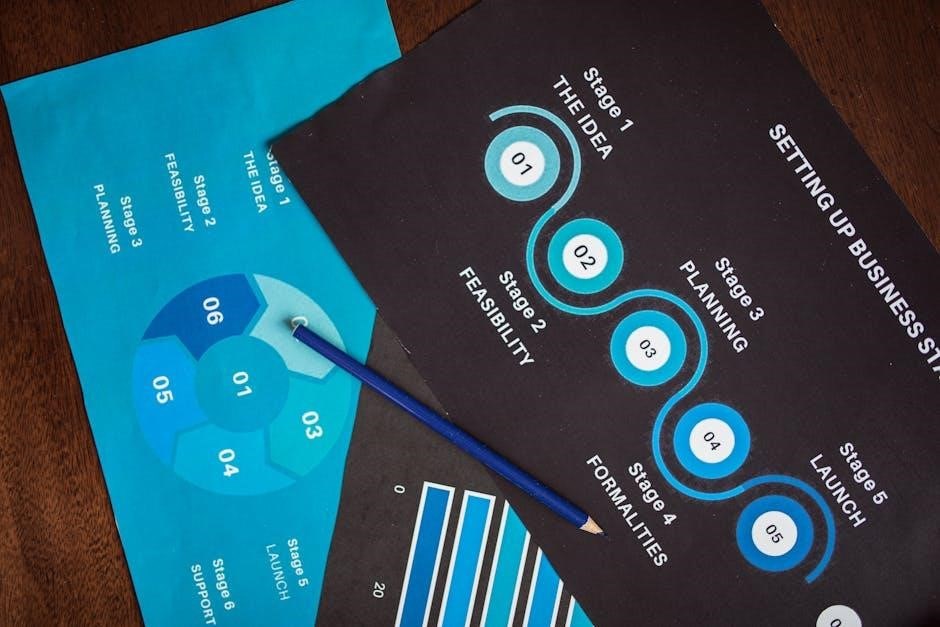Achieving Mood Stability
Achieving mood stability involves reducing both manic and depressive symptoms. The treatment plan focuses on short-term goals like managing acute symptoms and long-term objectives for sustained emotional balance.
1.1 Short-Term Goals for Mood Management
Short-term goals focus on managing acute symptoms and stabilizing mood. These include reducing manic or depressive episodes‚ minimizing risky behaviors‚ and preventing hospitalization. Techniques like mindfulness‚ grounding exercises‚ and medication adherence are emphasized. Regular monitoring of mood shifts and stressors helps identify triggers early. The aim is to enhance daily functioning‚ improve sleep patterns‚ and reduce irritability or emotional reactivity within a specific timeframe‚ such as 4-6 weeks‚ to create a foundation for long-term stability.
1.2 Long-Term Goals for Sustained Emotional Balance
Long-term goals aim to maintain emotional balance and prevent relapse. Strategies include consistent medication use‚ lifestyle modifications‚ and stress management techniques. Regular therapy sessions and support from family and peers are crucial. The focus is on developing a healthy routine‚ improving overall functioning‚ and enhancing quality of life. These goals are tailored to the individual‚ promoting sustained stability and enabling them to achieve personal and professional milestones without significant mood disruptions over an extended period.
Improving Medication Adherence

Improving medication adherence is crucial for managing bipolar disorder. Strategies include using pillboxes‚ setting alarms‚ and educating patients about the benefits of consistent use to maintain stability.
2.1 Strategies to Enhance Consistency in Medication Use
Strategies to improve medication consistency include using pillboxes‚ alarms‚ and reminders. Education about the benefits of adherence and potential side effects can increase commitment. Family support and regular follow-ups with healthcare providers also play a key role. Simplifying routines and integrating medication use into daily habits‚ such as linking it to meals or bedtime‚ can enhance adherence. Additionally‚ leveraging technology‚ like mobile apps‚ can provide reminders and track medication use‚ ensuring a consistent regimen.
2.2 The Role of Psychoeducation in Medication Adherence
Psychoeducation equips patients with knowledge about bipolar disorder and their medications‚ fostering better adherence. It addresses misconceptions‚ explains the importance of consistency‚ and highlights the consequences of non-adherence; By engaging patients and their families‚ psychoeducation encourages active participation in treatment. Regular sessions also provide a platform for discussing concerns‚ thereby improving understanding and motivation. This educational approach strengthens the therapeutic alliance and enhances the likelihood of sustained medication use‚ ultimately contributing to better symptom management and long-term stability.
Enhancing Coping Skills and Cognitive Behavioral Therapy (CBT)
Cognitive Behavioral Therapy helps identify and modify negative thought patterns‚ reducing symptoms and enhancing emotional regulation. It equips individuals with practical coping strategies to manage stress effectively.
3.1 Cognitive Behavioral Therapy Strategies for Bipolar Disorder
Cognitive Behavioral Therapy (CBT) helps individuals identify and challenge negative thought patterns‚ promoting emotional regulation. Techniques include cognitive restructuring‚ behavioral activation‚ and mindfulness. These strategies address symptoms like impulsivity and irritability‚ fostering better coping mechanisms. CBT also teaches skills to manage stress and prevent relapse‚ enhancing overall mental health. By focusing on practical problem-solving‚ CBT empowers individuals to maintain stability and improve daily functioning‚ aligning with long-term treatment goals for bipolar disorder.
3.2 Stress Management and Problem-Solving Techniques
Stress management and problem-solving techniques are essential for managing bipolar disorder. These strategies help individuals identify triggers‚ develop coping mechanisms‚ and improve emotional resilience. Techniques include mindfulness‚ deep breathing exercises‚ and structured problem-solving approaches. Regular practice of these methods enhances the ability to handle daily challenges effectively‚ reducing the risk of mood episodes. Incorporating these skills into a treatment plan promotes long-term stability and improves overall quality of life for individuals with bipolar disorder.

Establishing a Healthy Routine
Establishing a healthy routine involves creating a consistent daily schedule‚ including sleep patterns‚ meals‚ and activities. This structure helps manage symptoms and improve overall functioning.
4.1 The Importance of Daily Structure and Routine
Establishing a daily routine is crucial for managing bipolar disorder. Consistent sleep schedules‚ meal times‚ and structured activities help stabilize mood and reduce symptom unpredictability. A predictable structure provides a sense of control‚ reducing anxiety and stress. Regular routines also aid in organizing tasks‚ improving productivity‚ and maintaining healthy habits. By fostering a sense of normalcy‚ daily structure supports long-term emotional and functional stability‚ which are key goals in bipolar disorder treatment plans.
4.2 Role of Family and Peer Support in Maintaining Routines
Family and peer support play a vital role in maintaining routines for individuals with bipolar disorder. Loved ones can provide reminders for medication and daily tasks‚ offering emotional encouragement and practical assistance. Social support networks help individuals stay accountable and motivated‚ reducing feelings of isolation. Involving family and peers in routine planning fosters a collaborative environment‚ enhancing adherence and overall well-being. Their involvement is essential for long-term stability and successful treatment outcomes.

Incorporating Self-Care Practices
Incorporating self-care practices is crucial for managing bipolar disorder. Regular exercise‚ healthy nutrition‚ adequate sleep‚ and mindfulness meditation promote emotional well-being and symptom management. Consistency in these habits supports long-term stability.
5.1 Healthy Lifestyle Habits for Bipolar Disorder Management
Adopting healthy lifestyle habits is essential for managing bipolar disorder. Regular physical activity‚ balanced nutrition‚ and consistent sleep schedules help stabilize moods. Exercise releases endorphins‚ improving emotional well-being‚ while a healthy diet supports brain function. Adequate sleep is critical for mood regulation‚ as sleep disturbances can trigger episodes. Mindfulness practices‚ such as meditation‚ enhance self-awareness and reduce stress. These habits contribute to overall wellness and long-term stability‚ making them integral to treatment plans.

5.2 Mindfulness Meditation and Its Benefits
Mindfulness meditation offers significant benefits for bipolar disorder management. It helps reduce stress‚ improve emotional regulation‚ and enhance focus. Regular practice can decrease symptoms of anxiety and depression‚ fostering a calmer mental state. By promoting self-awareness‚ mindfulness meditation enables individuals to recognize early signs of mood shifts‚ allowing for timely interventions. Studies show it can prevent depressive episodes and improve overall quality of life‚ making it a valuable adjunct to traditional treatments.
Psychoeducation and Insight Building
Psychoeducation helps patients and families understand bipolar disorder‚ its symptoms‚ and treatment options‚ enhancing insight and improving adherence to treatment plans for better symptom management.
6.1 The Importance of Psychoeducation in Bipolar Disorder Treatment
Psychoeducation is crucial for empowering patients and families with knowledge about bipolar disorder‚ its symptoms‚ and treatment options. It fosters insight‚ improving adherence to treatment plans and enhancing symptom management. By understanding the condition‚ individuals can recognize early warning signs of episodes and develop coping strategies. This education also reduces stigma and encourages active participation in care‚ leading to better long-term outcomes and improved quality of life.
6.2 Techniques to Enhance Insight and Self-Awareness
Techniques like cognitive-behavioral therapy (CBT) and mindfulness meditation help individuals recognize patterns and triggers related to their bipolar disorder. Journaling and self-monitoring tools allow patients to track mood changes‚ enhancing self-awareness. Family involvement and support groups also provide external perspectives‚ aiding in insight development. These strategies empower individuals to better understand their condition‚ anticipate episodes‚ and make informed decisions‚ improving overall management and adherence to treatment plans.

Setting Realistic and Measurable Goals
SMART goals (Specific‚ Measurable‚ Achievable‚ Relevant‚ Time-bound) help individuals track progress and achieve meaningful outcomes‚ enhancing overall functioning and emotional well-being in bipolar disorder management.

7.1 Using SMART Goals in Bipolar Disorder Treatment Plans
SMART goals (Specific‚ Measurable‚ Achievable‚ Relevant‚ Time-bound) are essential for creating effective treatment plans. They help individuals set clear objectives‚ such as attending therapy sessions or maintaining a daily routine‚ ensuring progress can be tracked. For example‚ a goal might be to “Attend four CBT sessions within the next two months to improve coping skills.” This approach ensures goals are realistic‚ tailored to the individual’s needs‚ and aligned with their long-term recovery and stability.
7.2 Regularly Assessing and Adjusting Treatment Goals

Regularly assessing and adjusting treatment goals ensures the plan remains effective and aligned with the individual’s changing needs. Progress is monitored through symptoms‚ functionality‚ and goal achievement. Adjustments are made based on feedback from the patient‚ family‚ and healthcare providers. This iterative process ensures the treatment plan adapts to new challenges and celebrates successes‚ fostering long-term stability and wellness. Continuous evaluation helps identify areas needing refinement‚ ensuring the goals remain realistic and relevant to the patient’s evolving circumstances.

Preventing Relapse and Maintaining Wellness

Preventing relapse involves maintaining therapy‚ lifestyle changes‚ and adhering to medication. Regular monitoring and a relapse prevention plan help sustain wellness and long-term stability effectively.
8.1 Maintenance Therapy for Long-Term Stability
Maintenance therapy is crucial for preventing recurrence of manic or depressive episodes. It involves ongoing medication use‚ regular psychotherapy sessions‚ and lifestyle adjustments. The goal is to sustain emotional balance and overall well-being. Consistency in treatment ensures long-term stability‚ reducing the risk of relapse. This approach helps individuals with bipolar disorder maintain functional daily lives and achieve enduring mental health.
8.2 Developing a Relapse Prevention Plan
A relapse prevention plan identifies early warning signs of mania or depression‚ such as mood swings or sleep disturbances. It outlines actionable steps‚ like emergency contacts and coping strategies‚ to manage triggers. Regular monitoring and adjustments ensure the plan remains effective. Family and peer support play a key role in recognizing signs and providing timely intervention. This proactive approach helps individuals with bipolar disorder maintain stability and prevent full relapses‚ promoting long-term wellness and independence.